St Hugh's Home for Boys, Lincoln, Lincolnshire
St Hugh's Home for Boys was established by the Waifs and Strays Society in 1896 at Newport House, 23 Newport, Lincoln. Its inauguration had been made possible by four years of local fund-raising, boosted by a donation of £500 by two ladies who wished to remain anonymous. The home was officially opened on September 12th 1896 by the Bishop of Lincoln.
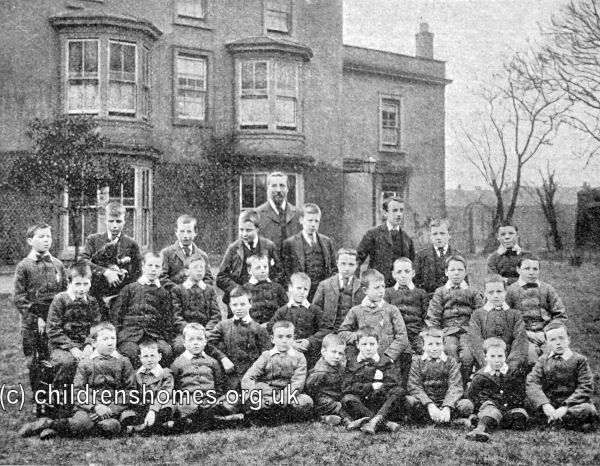
Boys and master at St Hugh's Home for Boys, Lincoln, c.1902. © Peter Higginbotham
Accommodation was provided for 36 boys aged from 7 to 12, with four extra beds provided in case of sickness. Thirty-six of the beds had been presented by different county families, each bed bearing the crest of its donor. In 1899, a play-room, toilet and covered playground were added to the facilities at a cost of £500.
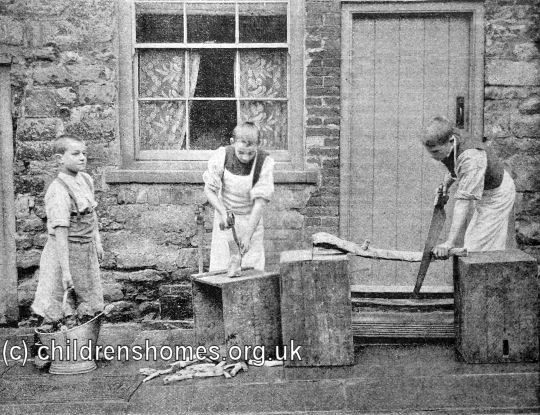
Sawing firewood at St Hugh's Home for Boys, Lincoln, c.1896. © Peter Higginbotham
The daily routine began with the ringing of a wake-up bell at 6a.m. In the dormitories, each of which had 5 or 6 beds, the boys then dressed under the eye of their appointed boy 'officer'. After private prayers, two boys stripped the beds, folded up bed-clothes, turned mattresses and opened windows to air the room for a while. Boots were then cleaned and washing took place in the washroom below. In the coldest weather warm water was allowed, but at all other times cold. Teeth were next cleaned. Work followed, with Dormitory boys making up the beds, and sweeping and dusting their rooms. Others did the same in dining, prayer and committee rooms, while the kitchen found work for more boys. At 7a.m. the master, accompanied by two boys, woke up the little ones, some of whom needed help dressing. When dressed, all knelt to say aloud the Lord's Prayer, the Collect for Grace, and the Grace of the Lord. Two older boys then oversaw the washing and toothbrushing of the little ones. After completing their work, each boy went to the prayer room to read his daily portion of scripture. At 7.45, breakfast consisted of cocoa and bread and dripping. The meal lasted about twenty minutes, the master and matron taking theirs at a side table. After grace was said, their were communal prayers. More work followed — washing-up, scrubbing, etc. At 8.50 the bell rang for school. Boys at the home attended the ordinary National Schools in Lincoln, marching there in line. On Mondays, two boys assisted the laundress all day with the weekly wash. The officers dined at 11.45, just before the boys came back and played until their dinner at 12.45. A typical meal consisted of cold beef, potatoes, boiled rice with jam or treacle, and bread. The boys then returned to school, followed by more play back at the home from 4.30. Some boys kept their own small garden plots or helped keep the lawns neat. Four of five boys took turns each week in washing their socks. In summer, an hour's cricket or a bath at the @waves@ brought the day to end, with prayers at 7.30 and "good night" to the master.
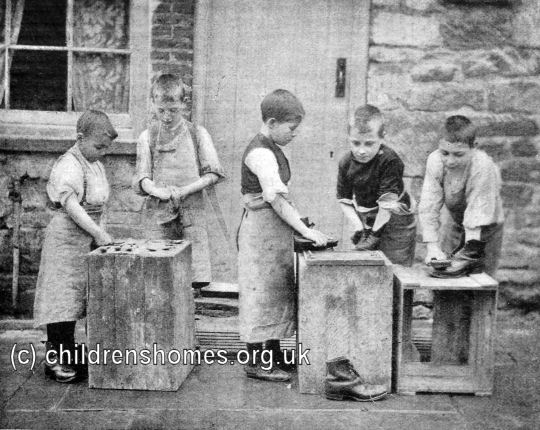
Boot polishing at St Hugh's Home for Boys, Lincoln, c.1896. © Peter Higginbotham
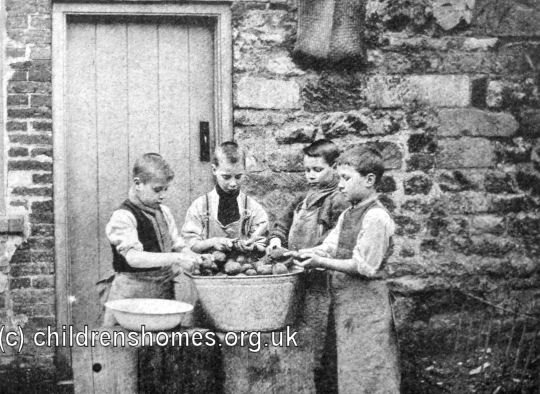
Peeling potatoes at St Hugh's Home for Boys, Lincoln, c.1896. © Peter Higginbotham
By the early 1900s, camping expeditions were organised in the summer holiday.
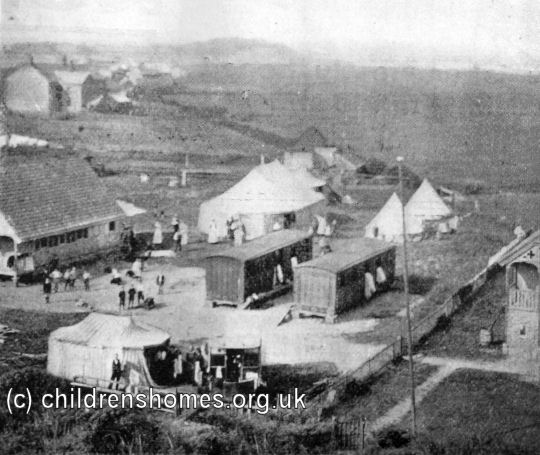
Camping out at St Hugh's Home for Boys, Lincoln, 1906. © Peter Higginbotham
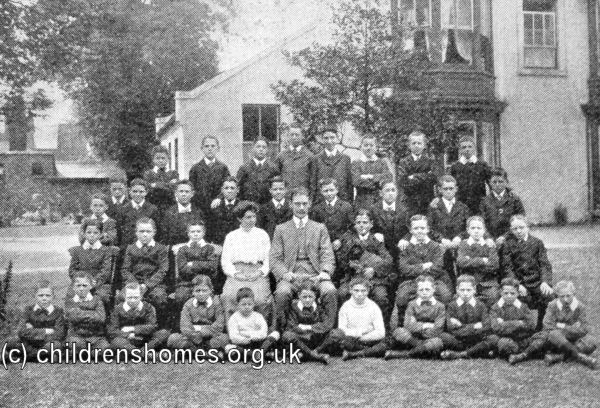
St Hugh's Home for Boys, Lincoln, c.1913. © Peter Higginbotham
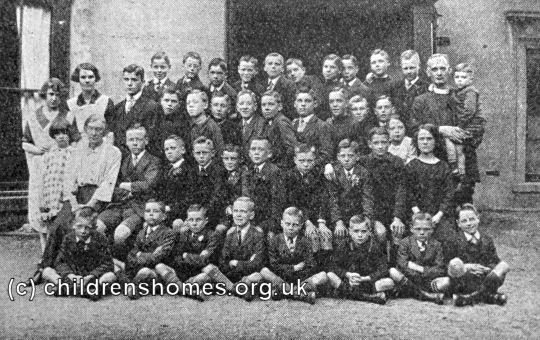
St Hugh's Home for Boys, Lincoln, c.1927. © Peter Higginbotham
By the early 1960s, the home had become a working-boys' hostel. It finally closed in 1972.
The property is now used as office accommodation.
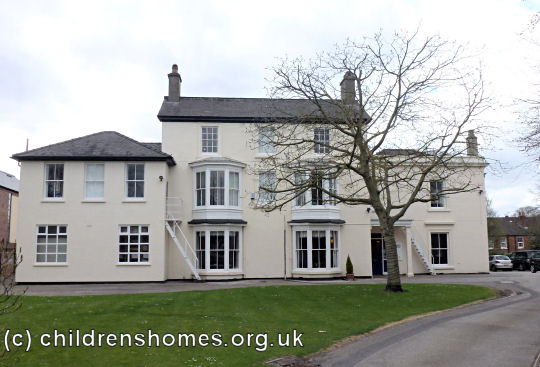
Former St Hugh's Home for Boys, Lincoln, 2013. © Peter Higginbotham
Records
Note: many repositories impose a closure period of up to 100 years for records identifying individuals. Before travelling a long distance, always check that the records you want to consult will be available.
- Index of the Society's first 30,000 children's case files ordered by surname.
- Index of the Society's first 30,000 children's case files ordered by date of birth.
- The Children's Society Records and Archive Centre is at Unit 25, Springfield House, 5 Tyssen Street, London E8 2LZ (email: archives@childrenssociety.org.uk). Files for children admitted to its homes after September 1926 were microfilmed in the 1980s and the originals destroyed. Some post-1926 files had already been damaged or destroyed during a flood. The Society's Post-Adoption and Care Service provides access to records, information, advice, birth record counselling, tracing and intermediary service for people who were in care or adopted through the Society.
- The Society has produced detailed catalogues of its records relating to disabled children, and of records relating to the Children's Union (a fundraising body mostly supported from the contributions of children).
Bibliography
- Bowder, Bill Children First: a photo-history of England's children in need (1980, Mowbray)
- Church of England Waifs and Strays' Society [Rudolfe, Edward de Montjoie] The First Forty Years: a chronicle of the Church of England Waifs and Strays' Society 1881-1920 (1922, Church of England Waifs and Strays' Society / S.P.C.K.)
- Higginbotham, Peter Children's Homes: A History of Institutional Care for Britain's Young (2017, Pen & Sword)
- Morris, Lester The Violets Are Mine: Tales of an Unwanted Orphan (2011, Xlibris Corporation) — memoir of a boy growing up in several of the Society's homes (Princes Risborough, Ashdon, Hunstanton, Leicester) in the 1940s and 50s.
- Rudolf, Mildred de Montjoie Everybody's Children: the story of the Church of England Children's Society 1921-1948 (1950, OUP)
- Stroud, John Thirteen Penny Stamps: the story of the Church of England Children's Society (Waifs and Strays) from 1881 to the 1970s (1971, Hodder and Stoughton)
Links
- Hidden Lives Revealed — the story of the children who were in the care of The Children's Society in late Victorian and early 20th Century Britain.
- The Children's Society
Except where indicated, this page () © Peter Higginbotham. Contents may not be reproduced without permission.


